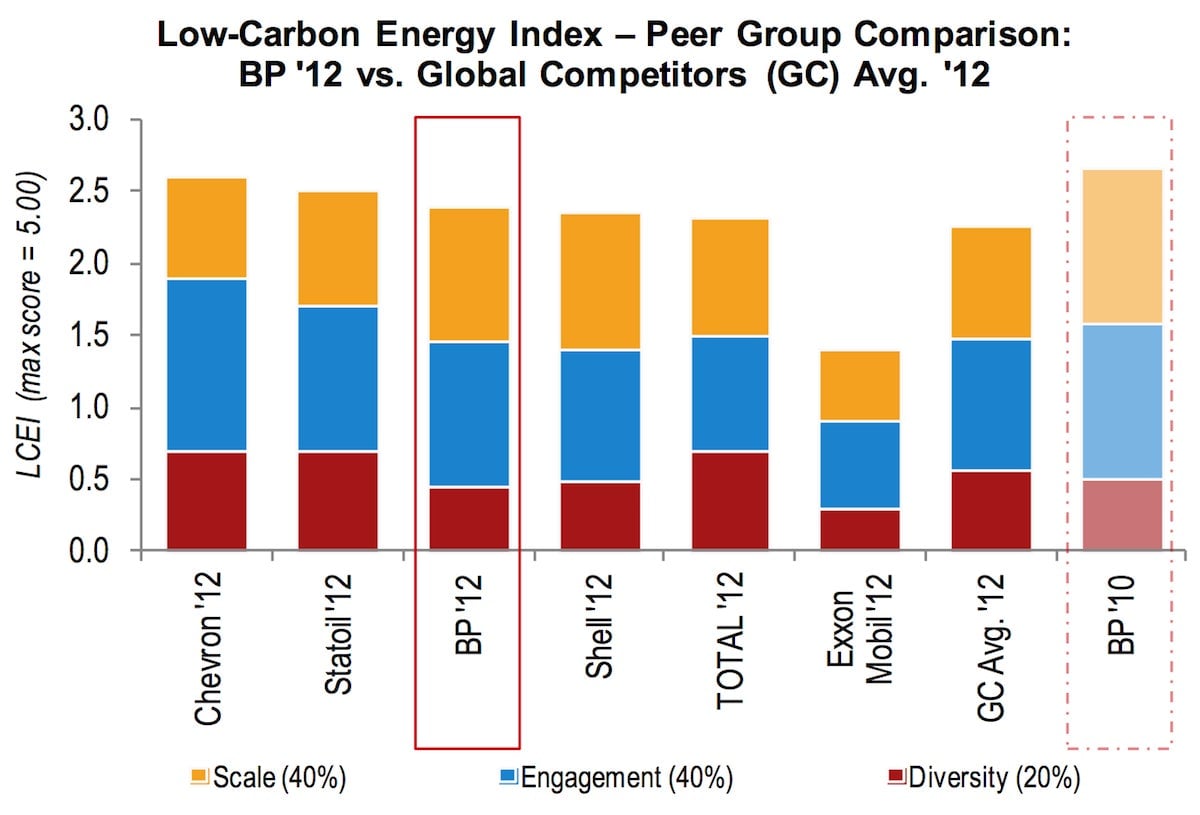Does BP now mean “Back to Petroleum”?
BP is losing its green sheen. In 2000, the company originally called British Petroleum declared itself “Beyond Petroleum,” changed its corporate colors to green, and said it would move aggressively to commercialize renewable fuels including solar, wind and biofuels from non-edible agricultural products. It set up numerous research facilities, including a $500 million center at the University of California at Berkeley, aligning itself with global politics and achieving street credibility with increasingly influential environmentalists. In 2010, it was the king of renewables, according to an index developed by PFC Energy, a Washington-based energy research firm (see chart above).

BP is losing its green sheen. In 2000, the company originally called British Petroleum declared itself “Beyond Petroleum,” changed its corporate colors to green, and said it would move aggressively to commercialize renewable fuels including solar, wind and biofuels from non-edible agricultural products. It set up numerous research facilities, including a $500 million center at the University of California at Berkeley, aligning itself with global politics and achieving street credibility with increasingly influential environmentalists. In 2010, it was the king of renewables, according to an index developed by PFC Energy, a Washington-based energy research firm (see chart above).
Fast-forward several years: curbing heat-trapping gases is no longer a winning political calling card, the economics of renewables has not materialized, and BP is under serious financial pressure stemming from the 2010 Macondo oil spill in the Gulf of Mexico. Last December, BP got out of the solar business, a move that allowed Chevron and Statoil to surge ahead in PFC Energy’s index for 2012. Now BP is retreating from the production of advanced biofuels. It announced on Oct. 25 that it will abandon plans to build a scaled-up, $400 million cellulosic ethanol plant in Highlands County, Florida.
In doing so it cedes ground to rivals in the green energy space and deals another blow to the struggling renewables sector. The decision in Florida is decidedly driven by technology and the market. Cellulosic ethanol, made from switch grass and other plants or weeds, is quite a ways in the future. “The industry is not ready to deliver on second-generation biofuels on a large scale,” said Steven Phillips, who manages the carbon strategy practice at PFC Energy. “The demand drivers are not there, either.” Meanwhile, China is the low-cost producer of solar panels, forcing rivals into bankruptcy around the world, and the US may not renew a tax benefit for the construction of wind turbines.
BP has invested in a low-carbon sugar-cane biofuels operation in Brazil, which it is scaling up, and corporate spokesman Matt Hartwig told me that the company will look to license the cellulosic ethanol technology that would have been used in Florida. Yet the Brazil project still relies on a food product, when one of the key goals of environmentalists is to avoid edible plants for fuel. And licensing cellulosic technology may be a long shot, considering that BP itself could not make a go of building a manufacturing plant itself.